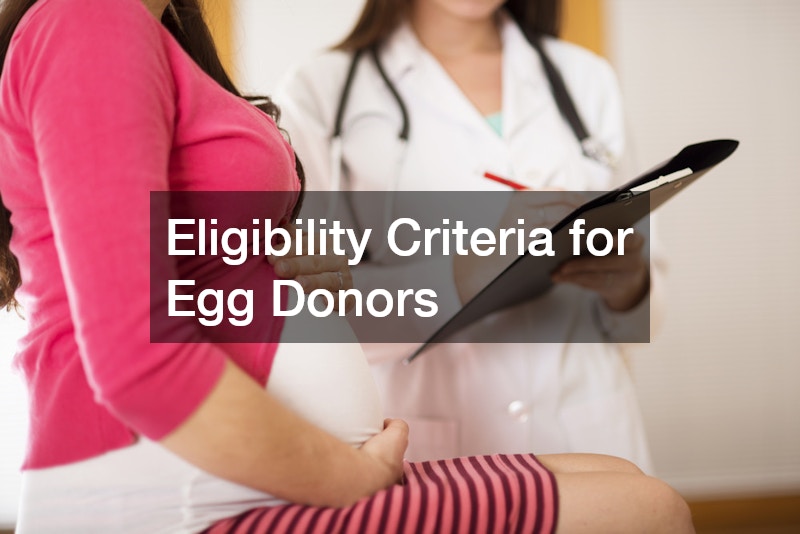Becoming an egg donor is a significant decision that can help those struggling with infertility. This article provides essential insights and answers to common questions potential donors might have.
Understanding the Egg Donation Process
Initial Consultation and Screening
The journey to becoming an egg donor begins with an initial consultation where you’ll discuss your medical history. This is often accompanied by a series of health assessments to ensure you are a suitable candidate.
Psychological evaluations are also conducted to ensure donors are mentally prepared for the process. This step helps both parties feel confident and secure moving forward.
Once cleared medically, candidates undergo hormone testing to determine their reproductive health. This helps clinics understand how well a candidate might respond to hormone treatments.
The Egg Retrieval Procedure
The egg retrieval procedure is conducted under sedation, ensuring comfort throughout the process. It’s a surgical procedure that typically involves inserting an ultrasound-guided needle into each ovary to collect the eggs.
Though it’s minimally invasive, the procedure carries risks such as infection or bleeding. Recovery is usually quick, with most donors returning to normal activities within a few days.
Doctors provide comprehensive instructions for post-procedure care to ensure swift recovery. Follow-up consultations are also scheduled to monitor health and address any concerns.
Legal and Ethical Considerations
Consent and Anonymity
Legal agreements are a critical part of the egg donation process, outlining the responsibilities and rights of both the donor and the intended parents. These contracts ensure that all parties are aware of their obligations and protections.
Donors can choose between anonymous and open donation. The choice impacts future contact possibilities and requires careful consideration.
Understanding the legal landscape is crucial, as laws vary by region and may impact anonymity and parental rights. Seeking legal advice can be beneficial before signing any agreements.
Compensation and Reimbursement
Egg donors are often compensated for their time and effort, which can vary significantly depending on the clinic and location. This compensation is separate from any reimbursement for travel or medical expenses incurred during the process.
It’s important to understand that the motivation for donation should not solely be financial, as ethical considerations play a substantial role. Clinics are clear about compensation structures, and donors are encouraged to ask questions to ensure transparency.
Despite the rewards, potential donors should be aware that not all expenses might be covered. Reading the fine print of any agreement will help in avoiding unexpected costs.
Health Implications for Egg Donors
Short-Term Health Effects
After egg retrieval, some donors may experience short-term side effects such as bloating or cramping. These symptoms typically resolve within a few days with proper rest and hydration.
The medications used to stimulate the ovaries can also cause temporary mood changes or soreness. Clinics usually provide guidelines on managing these symptoms effectively.
Donors must maintain regular communication with their medical team, particularly if experiencing unexpected symptoms. This ensures any complications are addressed promptly.
Long-Term Health Considerations
Current research suggests no significant long-term health risks associated with egg donation, although studies are ongoing. However, potential donors are encouraged to discuss any concerns with their healthcare provider.
The process does not appear to impact future fertility, allowing donors to pursue their family planning goals unhindered. Transparency with members of the healthcare team about personal medical history ensures informed decision-making.
Regular follow-ups with healthcare providers can aid in monitoring health post-donation. Keeping informed of ongoing research can provide peace of mind about the long-term effects of donation.
Emotional Aspects of Egg Donation
Psychological Impact and Support
While the physical process is well-documented, emotional effects can vary widely among donors. Support groups and counseling services can provide valuable resources to navigate these feelings.
The altruistic nature of egg donation often brings a sense of fulfillment. Nonetheless, some donors may experience unexpected emotions and should feel comfortable seeking professional support when needed.
Ongoing psychological support is encouraged throughout the donation process. Clinics prioritize donor well-being, addressing any mental health concerns that arise.
Impact on Family and Relationships
Becoming an egg donor can also influence personal relationships. Open communication with partners or family about intentions and expectations is crucial.
Some families may require time to adjust to the idea and discuss ethical or personal implications. Understanding and respecting differing perspectives can strengthen relationships during the journey.
Maintaining openness with loved ones about the donation is important for emotional support. This fosters a supportive environment conducive to positive experiences throughout the process.
Eligibility Criteria for Egg Donors
Basic Requirements
Eligibility criteria typically include being in the age range of 21 to 35 years, maintaining a healthy lifestyle, and having good overall health. Mental well-being is just as important, ensuring candidates can handle the psychological demands of donation.
Non-smokers with a stable Body Mass Index (BMI) are generally favored as candidates. Clinics also look for candidates with reliable transportation to attend necessary appointments.
Potential donors are expected to pass various medical screenings, ensuring no underlying health issues could interfere with the donation process. Honesty during evaluations is vital for an accurate assessment.
Disqualification Factors
Certain health conditions or lifestyle choices, such as smoking or drug use, can disqualify potential donors. Genetic disorders or a history of reproductive issues may also influence eligibility.
It’s also possible to be disqualified based on psychological evaluations or a lack of commitment during the screening process. Clinics prioritize both donor safety and the outcome for the recipients.
Understanding the comprehensive selection criteria helps manage expectations. Prospective donors can prepare accordingly, maximizing their chances of candidacy.
.




